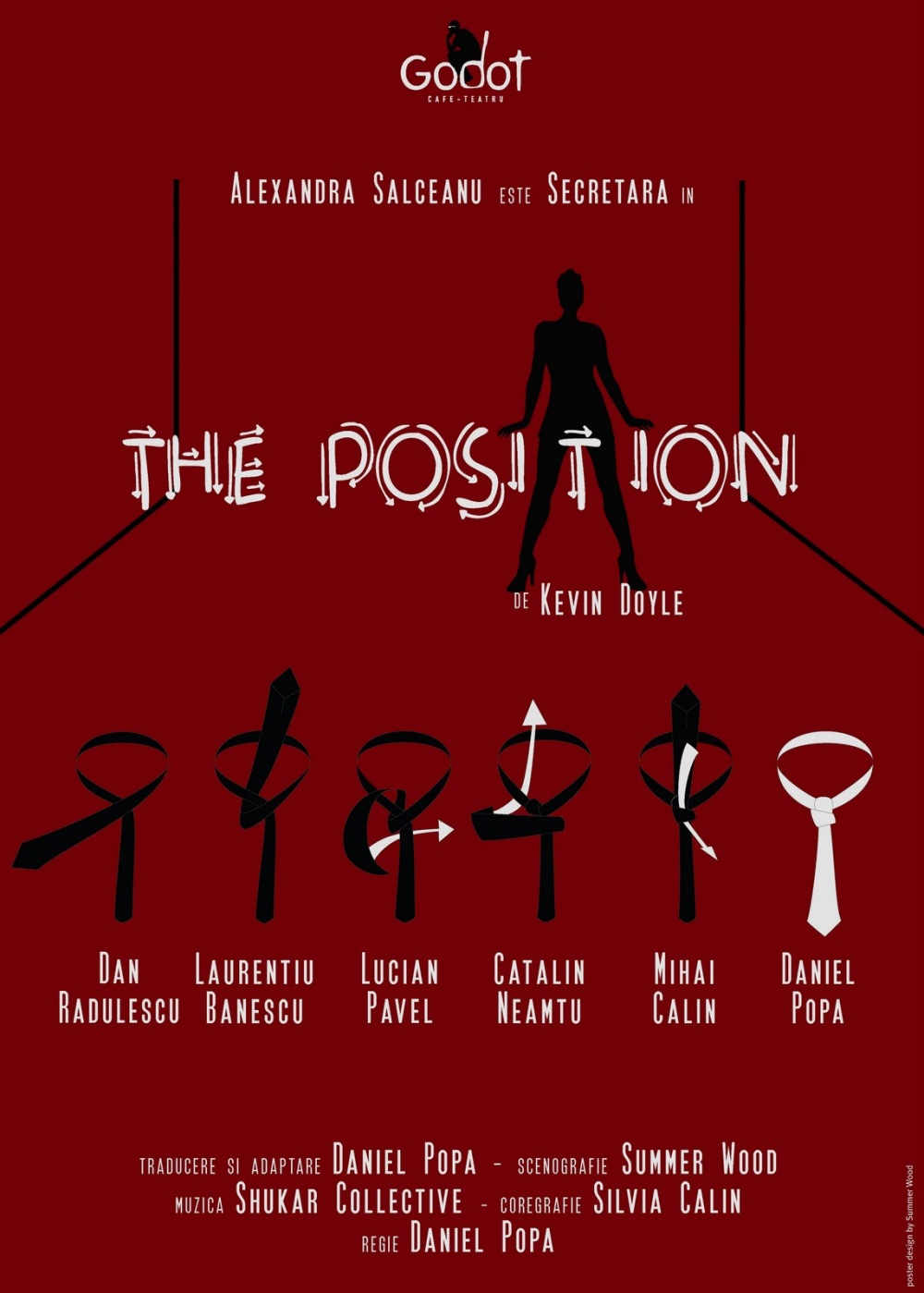Prima imagine care iti apare dupa ce citesti „The Position” este aceea a unei fabrici de jucarii ce pare sa functioneze perfect pana cand una din jucarii observa ca lucrurile sunt mult mai complexe decat lasa sa se inteleaga cei care trag de sfori. Iar cand in loc de jucarii iti amintesti ca este vorba de niste oameni, universul creat pe scena prinde dimensiuni noi.

„The Position” nu pune pentru prima oara problema omului – sclav al propriului sistem de legi. Absurdul situatiilor create aminteste chiar de universul lui Ionesco. Originala este insa solutia de a duce pana la extrem ticurile personale, dar mai ales pe cele sociale. Exact pe aceste ticuri sociale insista spectacolul, transformand in gest, miscare si dans, ritualuri contemporane.
„The Position” este un documentar despre starea de fapt a societatii de azi. E o revista de specialitate pe care ar trebui sa o rasfoiesti inainte sa te decizi ce universitate sa urmezi. Prezentata neutru, dar cu foarte mult umor – piesa ne da posibilitatea sa urmarim personaje ajunse in diferite grade de asumare a conditiei de om „contemporan”. Personajele resusesc sa comunice numai prin stereotipuri ale unui consumism in floare, intr-o era in care este promovat „visul universal”, de catre aceeasi oameni ce nu demult aveau pe buze „the american dream”. Personajele comunica insa cu publicul prin gest, miscare, dans. Incercand parca sa transmita mesaje secrete sub forma de serii de miscari codate, S.O.S.-uri celor ce mai pot face inca ceva.
Actiunea din „The Position” se petrece intr-o anticamera. Si pare foarte simpla. Sase barbati asteapta pe rand sa fie intervievati. Cinci dintre ei sunt efectiv clone, imbracati pana si cu acelasi costum, aceeasi pantofi, avand chiar si acelasi tip de servieta sau de cravata. Se dovedeste ca pesonajele au chiar si aceleasi concepte si principii despre viata. Si ca sa fie mai clar, descoperim ca eroii au pana si acelasi nume. Cel de-al 6-lea personaj insa, e diferit. E clar nepragatit pentru acest interviu si foarte speriat de de ce-ar putea sa i se intample dincolo de usa ce-l desparte de hatisul birocratiei, al monotoniei serviciului de la 9 la 5.
O schita a birocratiei ce ne uniformizeaza treptat transformandu-ne in acelasi timp in forme fara fond. Si cum altfel sa exprimi daca nu prin gest, miscare si dans, tot acest proces de transformare a omului contemporan intr-o marioneta, victima a evolutiei ce pare ca ne scapa de sub control.
Daniel Popa about Kevin Doyle ‘s The Position
I was flying back from New York to Bucharest 2 years ago. I bought one book only, containing the new plays and playwrights of the moment. I didn’t know yet what play I wanted to stage, I only hoped that something will strike me reading this book. And so I got to Kevin Doyle’s The Position. I was laughing alone in the plane, happy to discover the perfect play for a Romanian audience.
Kevin’s style reminded me of the absurd master whom the French claim is theirs, but Ionesco was Romanian. They will probably say the same about the American Kevin Doyle, so mature in his writing, that I didn’t expect him to be so young when we finally met, having Ionesco in my mind.
The reason I was so happy was that there was no better way to tell the Romanians what is going on with them right now, then to use Kevin’s approach to what’s happening to the whole world – so similar but so much sharper and to the point through its contemporarily means of expression than its Ionesco predecessor. Kevin’s work is so universally valid but I bet he didn’t have Romania in his mind when he wrote The Position. But then, to describe the process a whole society goes through these days, the global mechanization of every little thing, starting with gestures, ending with human beings. It may be an old theme, but he does it in such a way, that you just have to do something with the play after you read it.
The Position has humor mixing existential drama, daily actions and gestures becoming a sort of ritual dance, ending with a final tango interview that puts the finger on more than the getting a job issue. His work is so real, that when I tried to have it produced in Romania, I had the same things happening to me, as a creator. A whole process of having to wait for your turn, without knowing exactly when it will come; everybody smiling at you like they have known you for years; the same names that you bump into every office you go, the same passion for new gadgets the Romanians develop each day, the same absurd actions they take while thinking they’re doing their jobs.
And I could go on with the similarities of Kevin Doyle’s power of rending facts as they are, but the biggest of them all, is the ¨waiting state¨. Everybody waits in Romania. They don’t know what they’re waiting for, they just wait. Some of them were told to, some of them saw these other guys waiting, others just wait thinking it’s smarter, some because they don’t have the courage to act – no matter the action.
The Position is so complete that I dared to stage it even if I’m not trained as a director, but as an actor. It’s because the author put it all in there. You just have to give it to the actors and let it happen to them. You don’t really get this these days –such a great overview and full vision in one’s work like Kevin Doyle has done with his The Position.